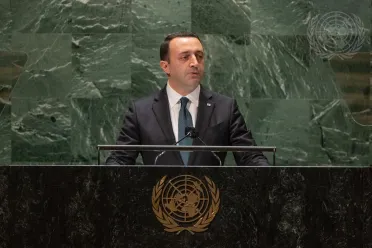Statement
Statement summary
IRAKLI GARIBASHVILI, Prime Minister of Georgia, said his country has always adjusted to meet new challenges. Calling for unity as the world continues its efforts to build back better from the pandemic, he said Georgia’s development plans are harmonized with the 2030 Agenda, including initiatives to accelerate environmental sustainability, protect the rights of all people, promote greater economic fairness and resilience, and support a revitalized United Nations. Noting that the country’s economy is on the mend after having sustained setbacks from the COVID-19 pandemic, he said its contributions to international security — despite being a small nation — have been “outsized”.
Citing one example, he said Georgia recently provided a transportation and logistics hub for thousands of evacuees from Afghanistan, facilitating over 60 flights, and accepted workers from Afghanistan-based non-governmental and other organizations to work temporarily in Georgia. “Our goal has always been to do what we can to support common action to advance the common good,” he said, drawing attention to Georgia’s goal of achieving European and Euro-Atlantic integration through membership in the European Union and the North Atlantic Treaty Organization (NATO). Pledging to press forward with reforms and modernization of every aspect of Georgia’s democracy and economy, he outlined its strong protection of human rights and its six consecutive democratic elections.
However, he cautioned that democracies around the world are under attack from “irrational and dark forces”, often aided and abetted by outside saboteurs. Urging countries to fight back through free and fair elections, he went on to outline Georgia’s dedication to investing domestically in education, infrastructure, eradicating poverty, strengthening the health system and diversifying its industrial, service and agricultural sectors. He also reiterated previous calls for international support to ending the illegal occupation of Georgian sovereign lands by the Russian Federation. Moscow is occupying 20 per cent of Georgian territory and seeking to undermine the country’s aspirations to join the European and Euro-Atlantic family.
Citing a humanitarian crisis — created by the occupying Power ‑ in the Abkhazia and Tskhinvali regions, he referred to a recent European Court for Human Rights verdict that found the Russian Federation guilty of occupying those two regions and responsible for human rights violations there. He called upon the global community to address violations of international law and facilitate the implementation of the European Union-mediated 2008 ceasefire agreement. Describing a situation in those occupied territories as “pre-planned ethnic cleansing to drive ethnic Georgians out”, he said it must be “seen for what it is” and put to an end.
Full statement
Read the full statement, in PDF format.
Photo

Previous sessions
Access the statements from previous sessions.
